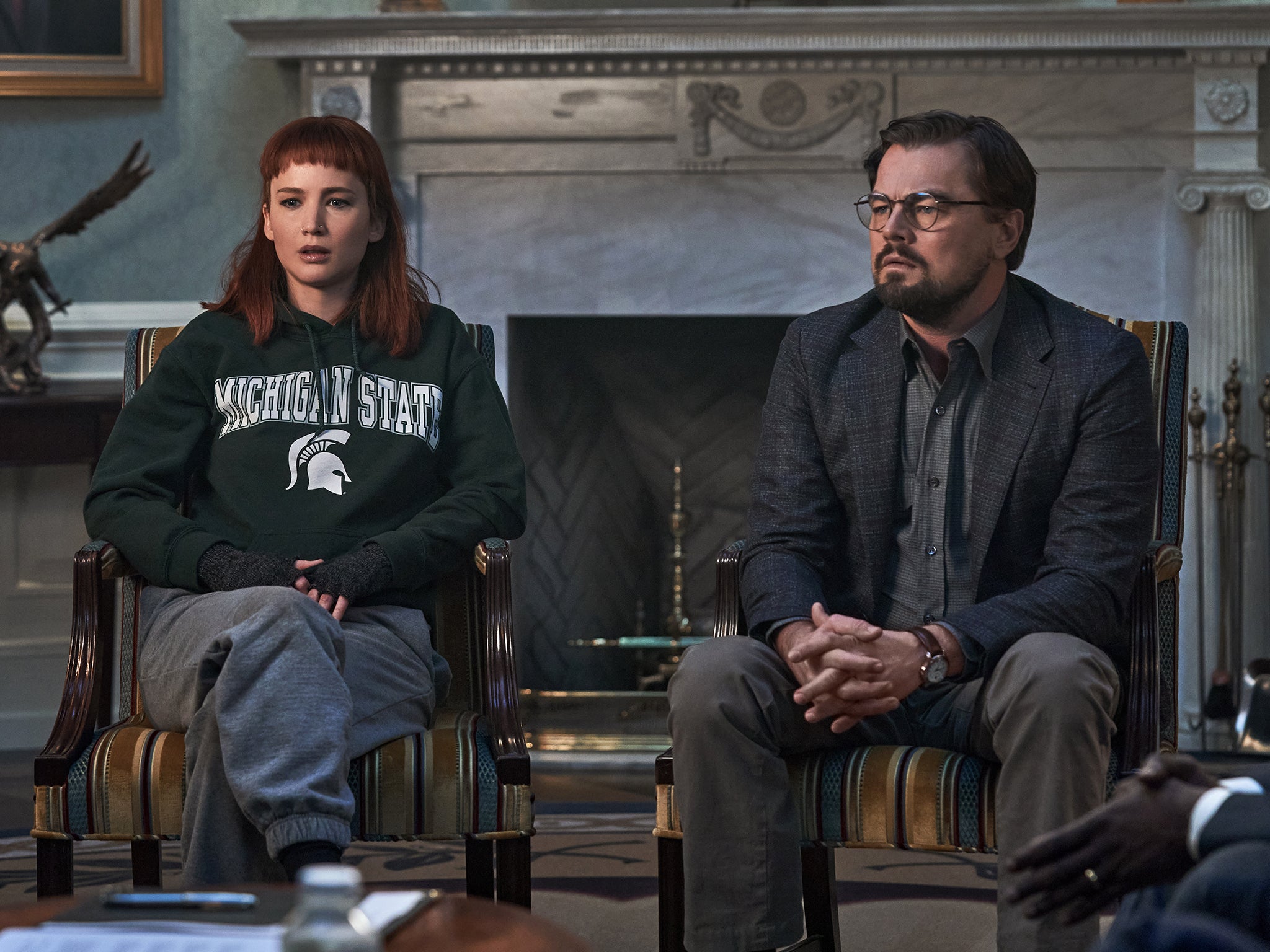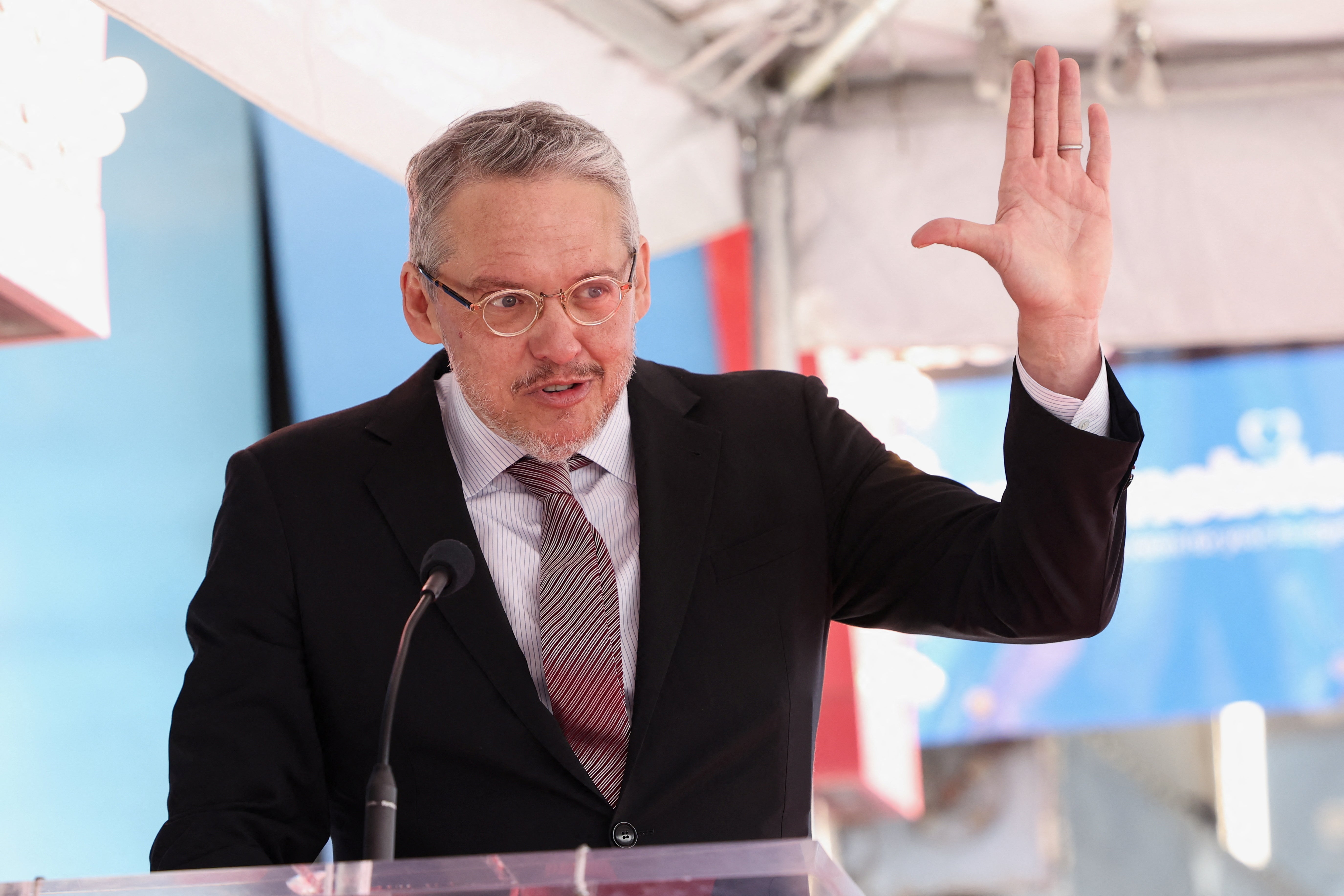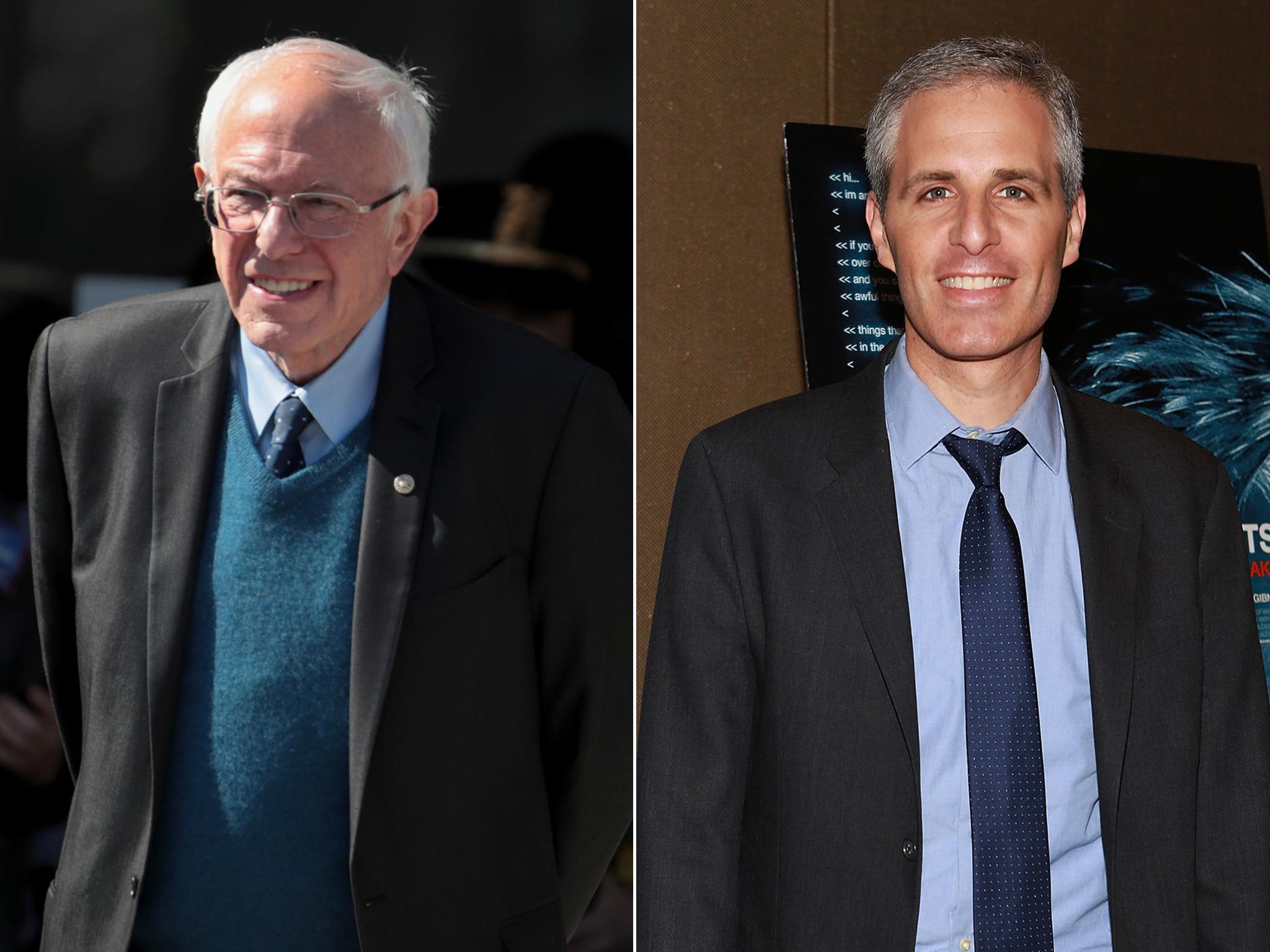
David Sirota is worried about his kids.
The former Bernie Sanders speechwriter is adjusting to a new role: Academy Award nominee. As he talks to The Independent, he’s driving around trying to find a building in Los Angeles – just days before he has to don a tuxedo for the first time since his wedding.
His wife – a state politician in Colorado – is flying in for the ceremony, where the Sirota-written satirical film, Don’t Look Up, is nominated in several categories. His parents, who still live in his native Pennsylvania, are also travelling to Los Angeles for the glitzy ceremony.
But the logistics of that ceremony pale in comparison to what he considers the biggest threat to humanity and the biggest crisis of our time: climate change.
“Thinking through this when you have kids ... I think about that a lot,” Mr Sirota, whose children are aged 8 and 11, tells The Independent. “My kids, our kids - what are we doing to them? What are we saying about their future - and do we care about their future? And I do.
“It’s very hard, when you start thinking about it in those terms, about what type of life and ability to survive we are giving our children and their children.
“When you really start thinking about it in a really specific way - about your own children - I mean, my kids live in Denver, Colorado. You know, Denver, Colorado has all sorts of problems from climate change. Will they be able to live there? If they can’t live there, if the climate gets worse, where are they going to live? I mean, these are really real questions.”

Mr Sirota, the grandson of Russian immigrants, grew up with a physician father in Pennsylvania - and, while he entered the political sphere as a Bernie Sanders staffer more than two decades ago, his brother followed their dad’s footsteps and became a doctor. He did his residency in Denver and, after Mr Sirota worked on a Montana political campaign and met his wife, they decided to follow his sibling because Colorado would be a good “compromise” for the Pennsylvania and Indiana natives.
While Mr Sirota wasn’t born in Denver, his co-collaborator - and fellow Oscar nominee - actually was. Adam McKay, who directed Don’t Look Up, was born in Colorado but raised in Massachusetts and Pennsylvania, though he didn’t meet Mr Sirota until they were adults.
Mr McKay is a comedy “icon,” according to Mr Sirota, best known for his hilarious writing and directing skills, particularly his cinematic collaborations with Will Ferrell. A former Saturday Night Live head writer - a job he secured at the age of 27 - Mr McKay has also had wild success with dramas ranging from the Oscar-winning The Big Short to television series Succession.
He and Mr Sirota became unlikely friends more than 15 years ago after, of all things, connecting over the North American Free Trade Agreement.
“I’d written some article about NAFTA, because I wrote a lot of trade stuff - and he contacted me and he liked the article that I’d written, which was interesting because it was kind of a relatively esoteric issue,” Mr Sirota tells The Independent.
The Hollywood heavyweight - who at 53 is just a few years older than Sirota - told him that, the next time he was in California, they should meet up.
“I happened to be in LA a couple of months later, and we got together - and we’ve just been friends ever since,” Mr Sirota says.
“Honestly, Adam and I share a political value system ... values that we bond over. I mean, we bond over lamenting, ‘Why are we not doing a Green Deal? Why is there not Medicare for all?’
“I mean, we see eye to eye on kind of, not only values, but I think we see eye to eye on what we believe our fundamental problem is - or problems are ... Also, I should say, he’s a hilarious person. He’s one of the most down-to-earth, nice people - and he’s also somebody who doesn’t judge based on how you are perceived or how powerful you are or famous you are.”

He adds that Mr McKay “doesn’t walk around like, ‘I’m a really important person ... I’m not putting it all that articulately, but it’s just to say there’s no air about him of self-importance.
“That’s why he’s so rare, in my view,” Mr Sirota tells The Independent. “He’s somebody who has these amazing superpowers of comedy and the like, but who decides to use that for his values ... in an industry that is often risk-averse. And there are very few people willing to do that.
“My admiration for him is based on that, because I know it’s so rare. It’s not only rare in Hollywood; it’s rare in politics.”
High on that list of values for both men, he says, is the battle against climate change - and the importance of making people pay attention to the “emergency.”
“That’s how the movie, the story idea ... kind of came up,” Mr Sirota says. “I was writing, was reporting about climate, and I was talking to Adam - and I had mentioned that some climate reporting I had done, a lot of time, it didn’t really feel like it landed.
“And I said, ‘It kind of feels like an asteroid’s headed toward Earth and nobody cares’ ... and, you know, then off to the races on the movie.”
The black comedy satire of Don’t Look Up focuses on scientists - played by actors including famed environmental activist Leonardo DiCaprio, Jennifer Lawrence and Meryl Streep - attempting to raise the alarm about a comet hurtling towards Earth.
Mr Sirota says he feels “frustration about why climate reporting oftentimes doesn’t feel like it lands.”
He tells The Independent that “the onus [is] on us as reporters, as content creators ... to be as compelling and as creative as possible to make the climate coverage - climate-themed movies, television shows and the like - make that all land.
“I don’t think it’s a lost cause. I’ll put it this way: If we can’t make the destruction of the livable atmosphere, the livable ecosystem, compelling, then that’s a creativity problem for us. I don’t want to blame the mass public; I just think we need to reach beyond how we conceive of news ... I’m a big believer in trying to meet people where they are, and I think our movie, the theory of the movie, not the story itself but the theory of what we put together, was: If you get a great cast with a movie that uses a somewhat familiar set of storylines, right - an asteroid headed towards Earth disaster movie - I mean, that has been a movie trope for forever.
The team’s goal, he says, was to “basically make a movie for the broadest possible audience - but then you use those tools to deliver what I think is a pretty strong message about science and an allegory about climate. Then you can reach a lot of people. You can make it count.”
It clearly did count; not only did it top the Netflix viewership figures but Don’t Look Up has also been nominated in four Academy Awards categories.

“I’m shocked we even got nominated, to be honest,” Mr Sirota tells The Independent. “Our movie is in the here and now, and [people] have very, very strong opinions about it - and by the way, I’m not upset about that. I’m ont surprised about that. I know it would be that way.
“I was presently surprised, obviously, but I was surprised [by the nominations] and I’m actually encouraged by the fact that you can make a movie that wrestles with very difficult, controversial issues,” he says, adding that the movie “does not avoid controversy, does not avoid conflict and is recognized. I think there’s a culture of conflict aversion in our culture industries ... To be honest, from the beginning, I didn’t think we’d even be able to make the movie.”
He’s certainly delighted by the result, however.
“I’m not patting ourselves on the back, but I can just tell you, we thought a lot about: How do we make sure that this movie reaches as many people as possible?” Mr Sirota says. “It wasn’t a movie designed for a niche audience, and I think that - I think about this a lot as a journalist, which is ‘How do I write my stories, how do I pick topics, how do I do all the work that I do that gives ... the final product the best chance of reaching the widest possible audience?’ - so that really is kind of a generalised set of thoughts, it’s not a specific, ‘Oh, we have to do this, we have to do that.’”
He does, however, concede that “it’s demoralising to feel like this is an emergency and it’s hard to get the public invested in following it and acting on it.”
Catching the attention of the entertainment industry, however - to the extent of coveted Oscar nominations - is certainly a step, though Mr Sirota says he does not exactly feel comfortable in Hollywood circles.
In the runup to the ceremony, he says, he “got to spend some time with Maggie Gyllenhaal and the guy who wrote Dune ... these people are not only nice but just incredibly impressive.”
He describes the Hollywood elite as “the most creative people in the whole world - so it’s really been a thrill.”
Underlying that excitement, however, is a passion for change - one that’s central to the Oscar-nominated film.
“Our movie is designed to hold up a mirror, to use an allegory to hold up a mirror, to some of the big dynamics in our society that prevent us from doing what science is telling us we absolutely, positively need to do,” Mr Sirota tells The Independent.
“Was the comet metaphor a perfect one-to-one metaphor for climate change? No,” he says. “I will concede that no metaphor is entirely perfect, but the metaphor ... Was our movie a climate movie? Or was our movie a movie about how we don’t communicate with each other in a productive way anymore?”
He adds: “My view, our view, is fundamentally about whether we can communicate with each other in a productive way anymore - and whether we can process basic, verifiable facts in a constructive way.”
He hopes the movie is already prompting viewers - whether they be politicians or voters - to process information more critically.
“My opinion is that, in all sorts of ways, it has shaken our viewership, the media, political system, to say: Hey. We have a problem,” he says, adding that the film is “not designed to say, We must do X, Y and Z - like this policy, that policy.
“It’s designed to say that we have to [be] aware of the ways that we are deterred - cynically deterred - from doing what we already know we need to do. We need to be aware that we’re being manipulated ... the next time you flip on cable TV or the next time you see a politician talking, the hope is that people who saw our movie think, you know, am I being manipulated here, or what’s the agenda behind this?
“Why is this person saying, doing something?” he says. “The hope is to raise that awareness. Not to be too high-fallutin about it, but that’s the basic practice of a democratic society. You need to be informed. The population needs to be informed to make good decisions.”







